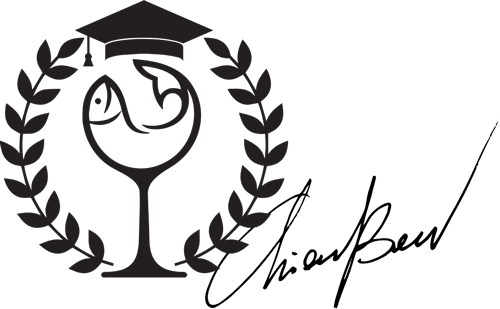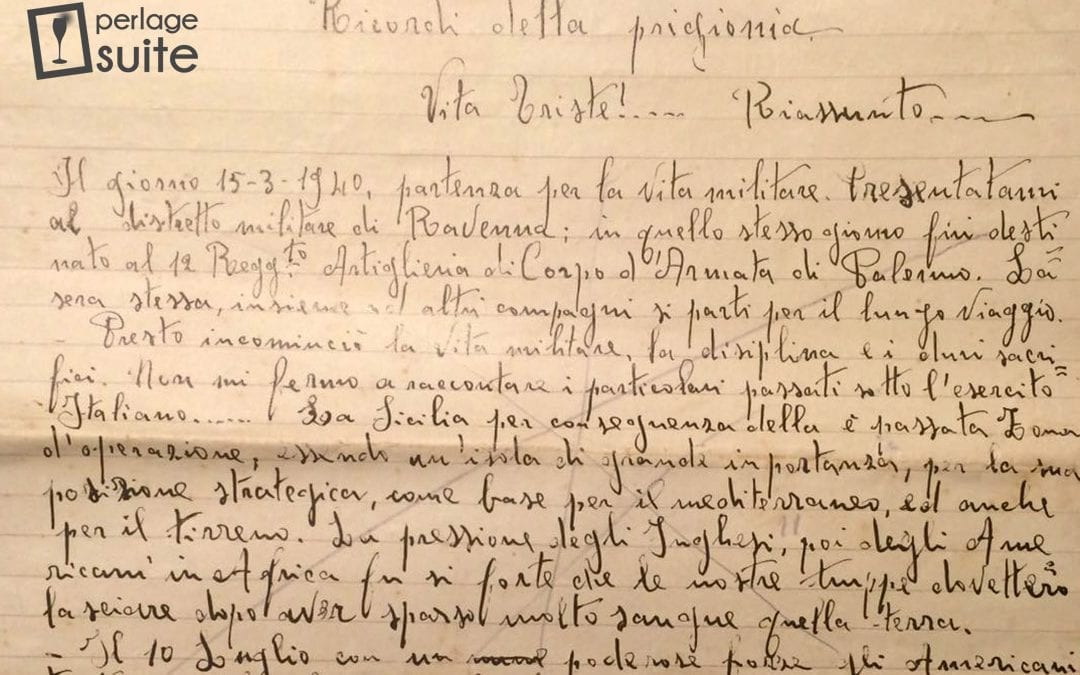I started preparing this article on 27 January... then of course it took a while to reconstruct everything. I know this is a wine blog, but on the occasion of Remembrance Day I wanted to make a toast to my grandparents and great-grandparents, with Grandpa Mario's favourite wine... who brought me up with my parents.
Pictured above is a passage from my grandfather Mario's memoirs, written in his own hand many many years ago ❤
I wanted to write an article on Autochthonous is Born of theGo Wine Association and Show Cooking organised by MasterChef e Ford Italy with the two eliminated from the last episode Marco M. and Marco V., then I remembered that today is 27 January and, as every year, we celebrate the Remembrance Day. On this date, the Red Army troops of Stalin's Socialist Communist Russia, not so long ago in 1945, liberated the Auschwitz concentration camp in Poland where my great-grandfather Clement was also deported as a political prisoner. So I decided to change all the tones of the article and write a few memories of my grandparents at the time of the war, and make a toast to them, the brightest stars in my sky, so as not to forget. Historical memory is a treasure that must always be treasured because it can safeguard us from making the same mistakes as in the past. That is why I thank Grandpa Mario, Grandpa Wagner and Grandpa Clemente for telling me their stories... and not growing up hoping that, like a modern Cinderella, I too will have a Prince to save me. Instead of bamboozling children with fairy tales far removed from reality, wouldn't it be better to tell them the life stories of their grandparents so that they become better adults?
I come from the reddest land in Italy, the Romagnaand on our houses, on State Road 9 Via Emilia, across the Senio river, falls the famous Gothic Line where in the spring of 1945 more than 60,000 Resistance partisans played a decisive role in the breakthrough of the Anglo-American troops over the German border. About 75,000 Axis soldiers (German and Italian), 65,000 Allied soldiers (British and American) and about 60,000 civilians died. The Gothic Line deeply marked my land, which still bears the marks of the trenches and fortifications. And it marked its inhabitants even more deeply: every grandfather has more than one story to tell.
After the Manifesto of the Race drafted by Mussolini himself in 1938 and signed by 10 scientists of the time, first Jews and southerners (defined as belonging to the inferior Mediterranean race... when I hear a southerner declare himself a fascist, I wonder if he has ever really studied fascism!) began to be persecuted, then also political opponents, Islamists, prisoners of war, homosexuals, the mentally ill and the handicapped. In that year, Italy also lost two of the greatest minds of all time: Albert Einstein (Jew, atheist, humanist, pacifist, communist) and Enrico Fermi (anti-fascist, Jewish wife, Freemason of the Grand Orient of Italy) who were forced to flee to the United States. But it was only in 1943 that Mussolini decided to support the project of total annihilation of all those people deemed unworthy of living in pursuit of the goal of pure race that he shared with Adolf Hitler.
Wagner Bassi and the shelter on the Gothic Line
My paternal grandfather Wagner Bassi was born in Cotignola (RA) in 1925 and when fascism fell in July 1943 he was serving in Avellino. After the armistice of 8 September 1943, to avoid being captured by German soldiers, he and a fellow countryman fled. My grandfather and his companion took refuge with a peasant family in the Lugo countryside of Santa Maria in Fabriago, who dug a shelter underground in a wheat field. At night, the women of the family brought them food through a carefully camouflaged trapdoor. They remained hidden underground for a few months, only to return to Cotignola at the beginning of winter. Here, too, they continued to hide to avoid being found by German soldiers, either inside houses or in shelters underground. Cotignola's front on the Gothic Line was operational until 10 April 1945, when all that remained of the entire town was a pile of rubble. Despite all that he had suffered, in 1946 he was called up for military service first in Avellino, then in Rieti. When he returned home, his job was, like that of many others, to clear the rubble caused by the bombing. Given the great difficulties of the period, my grandfather emigrated to Argentina on 5 April 1949 with a two-year work contract in his pocket.
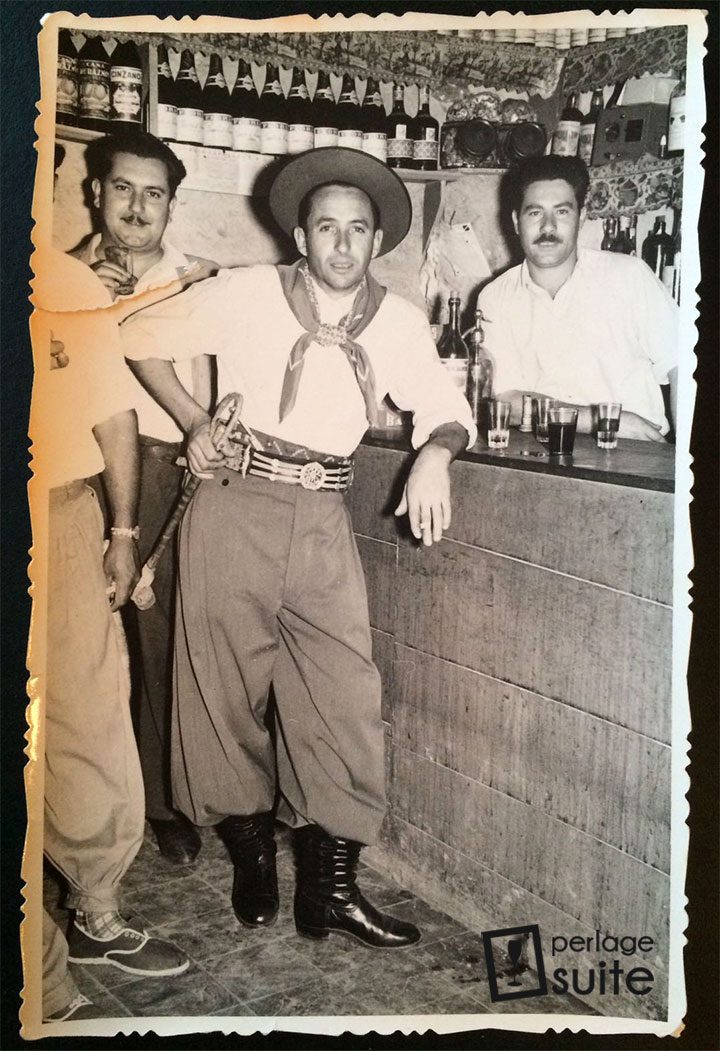
My grandfather as 'Goucho' in Argentina.
In those years, Argentina was a fast-growing country and there was a lot of work. In 1955 my grandmother Lelia joined him and the following year in Ezeiza, in the province of Buenos Aires, my father Daniel Alberto was born, then his brother, my uncle Sergio. After 11 years, since the situation in Italy had improved, my grandfather returned home. My grandmother spoke to me many times about the years she spent in Tristán Suárez with such nostalgia and a wonderful light in her eyes.
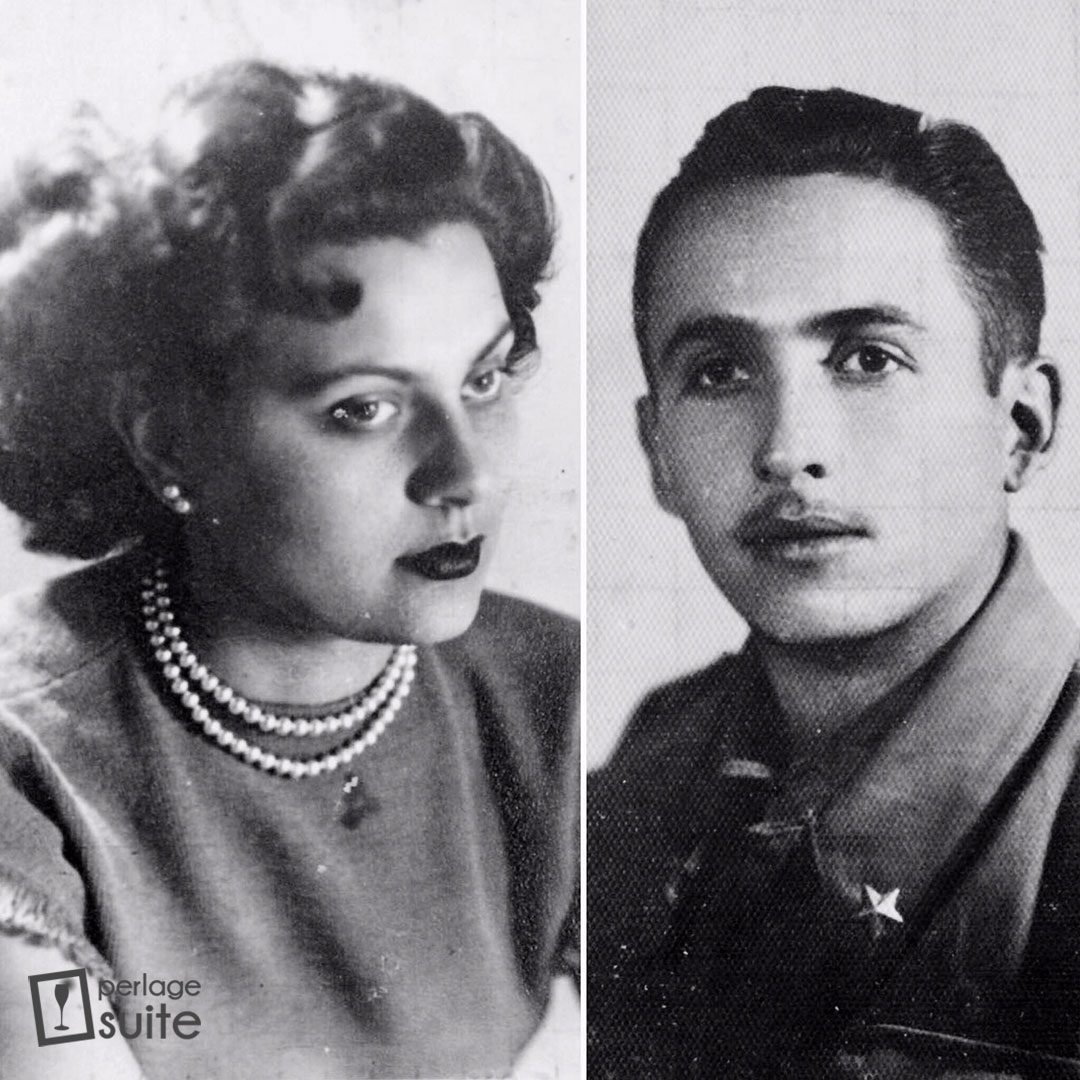
Grandpa Wagner and Grandma Lelia... one more beautiful than the other ❤
.
Remembrance Day: Clemente Orsoni and the Escape from Auschwitz
My great-grandfather Clemente, known as 'Minto', was born in 1904 in Granarolo Faentino, Romagna, and married my great-grandmother Teresa, known as 'Bina', at the age of 24. In the same year, my dear grandmother Lelia was born.
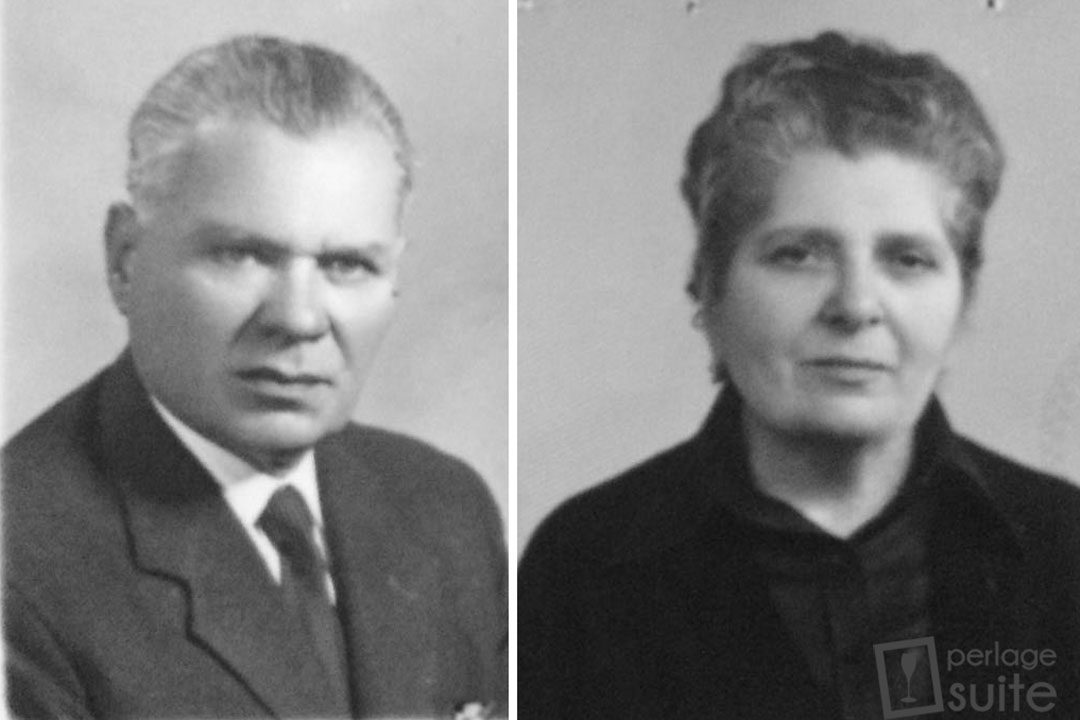
Great-grandfather Minto and great-grandmother Bina.
A pacifist and communist, he dreamt of a world of prosperity for every man, without disparities or social classes. During the regime, every citizen was obliged, regardless of his or her will, to join the party structures where he or she would be 'integrated and framed from cradle to grave'. My great-grandfather always refused to take party membership because it was in stark contrast to his values of peace and equality, and this cost him his job as an anti-fascist. Bina helped Minto support the family by working as a seamstress, until in 1935 the difficulties became such that he had to leave for Eritrea first and Libya later, colonies where Fascism was expanding its regime, and there he worked digging trenches to send Bina some money to support my grandmother Lelia and her sister Anna. In October 1942 Minto came home, but not for long: the fascists picked him up and took him to Ravenna. Here they told him they were sending him to Germany to work because for a subversive like him it was the only way to bring some money home. My great-grandfather, on the other hand, was taken to the Auschwitz extermination camp and interned as a political prisoner, where he saw and suffered things that a Sane human mind can hardly conceive. Minto, like all political prisoners and opponents of the regime, could not speak to anyone because they would have shot him on sight.
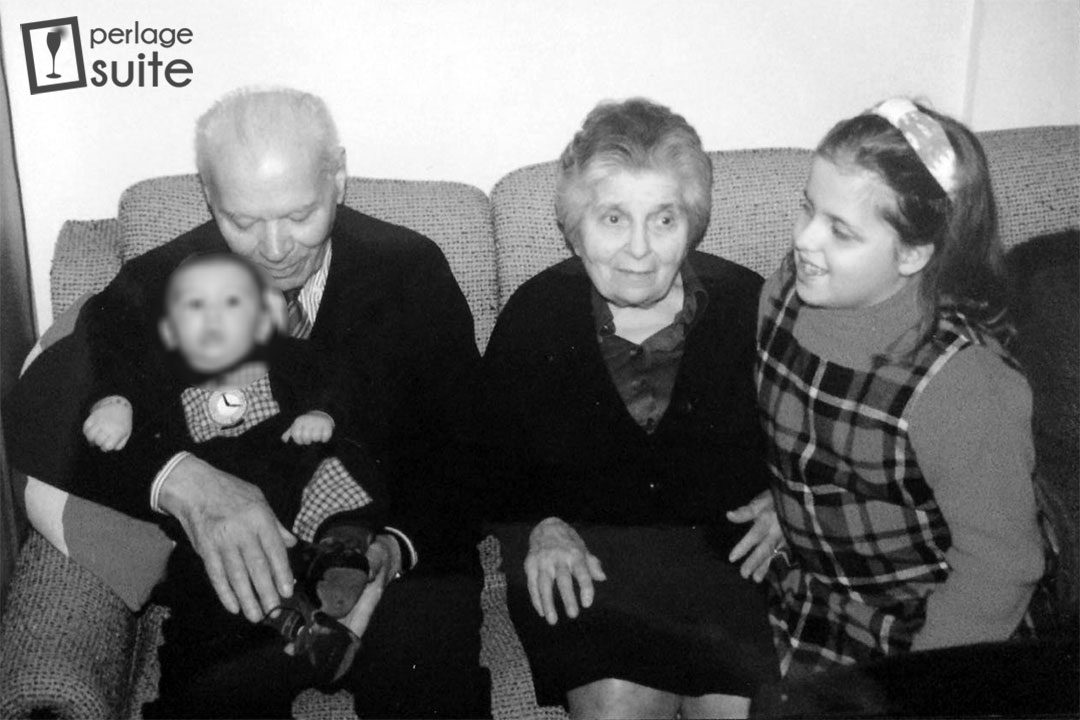
My great-grandparents... and the chubby tartan-clad baby guess who she is....
After some time working in extreme conditions, without food or hygiene, a German S.S. commander asked the prisoners if there were any bricklayers and plumbers to renovate his house in the country and my great-grandfather applied because he had already done that work as a boy with his father. At that time he was taken in by the Nazi commander's mother who, disagreeing with her son's actions, helped him escape and directed him to a group of Poles. From then on, Clement took part in their subversive actions, until one day he was captured together with some of them. A woman witness, before she too was shot, declared that Minto had nothing to do with it and was there by chance. After all, he could easily have been mistaken for a German with his beautiful blue eyes (he is the only one in my entire family, both paternal and maternal, who has blue eyes like me!). From that moment on, my great-grandfather searched for his way home, moving very cautiously from place to place. At home they had not heard from him since shortly after his departure, when they received a censored postcard with only a brief greeting and they certainly did not think he was in the Auschwitz death camp. He arrived with white hair, reduced to skin and bones, his teeth broken, his ears swollen and his body bruised from mistreatment. He weighed 38 kg and looked 80 years old. No one recognised him. For years he woke up at night overwhelmed by nightmares and people found it hard to believe the horrors of Auschwitz he recounted... he never forgot until his death at the age of 95.
Remembrance Day: Mario Tarabusi and his escape from the Austrian Lagers
My beloved grandfather Mario (just writing his name and I'm already crying... I miss him and Grandma so much I can't take my breath away and I would give my whole life to spend one more day with them... filling cappelletti with Grandma and drinking sweet Albana with Grandpa. How he loved sweet Albana! That's why to toast my grandparents I chose an Albana Passita... but more on that in a moment).
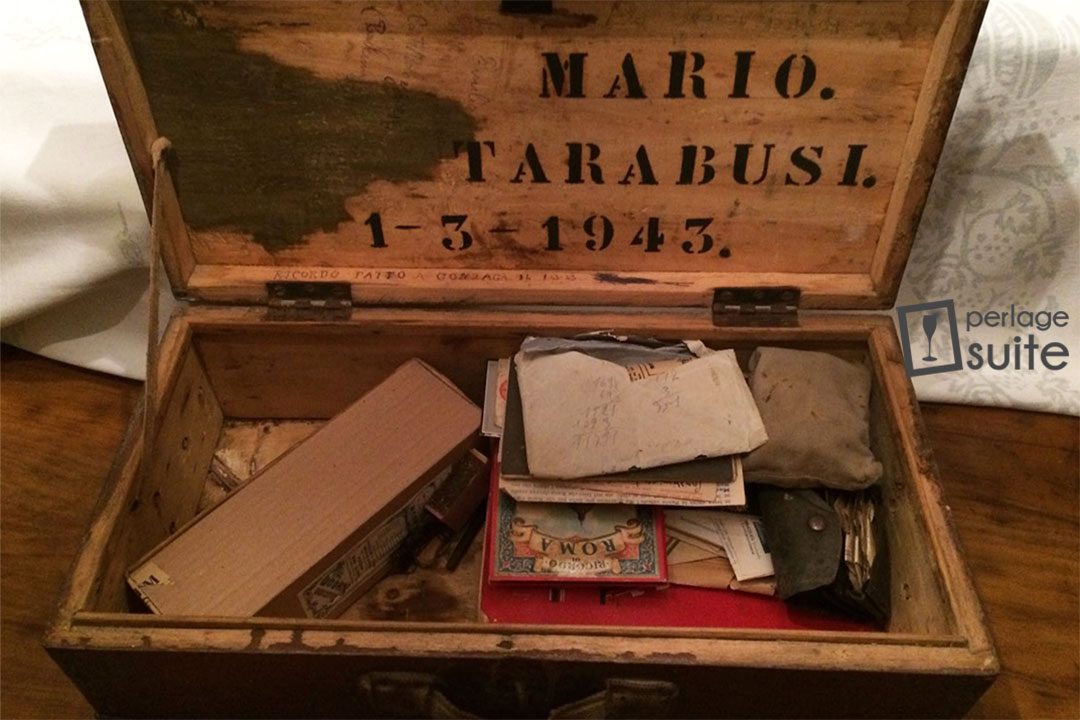
The briefcase of memories my grandfather made in Gonzaga in 1943.
Grandpa Mario used to tell me all the time about the time he spent in the war, and often sang the songs of the time too... always with a smile on his lips of someone who managed to survive so much horror, someone who managed to see a family being born... and someone who raised two daughters and a granddaughter who loved him very much and always will. I lived with grandfather and grandmother for 21 years before going to live in Ravenna. Fortunately, when they died, I was no longer living in that house. In fact, that house is not even my home any more without grandma coming to meet me with a bunch of hungry cats around and one of her big dresses revealing those dry, pale calves. And grandpa waiting for me in the armchair with his army-coloured braces, the half banana split with grandma and the rosary in his hands. Let's just say that ever since they died, I don't like going back to my hometown. I prefer to imagine them there waiting for me... and returning is the harsh confrontation with a reality that I am not yet ready to face even though several years have already passed.
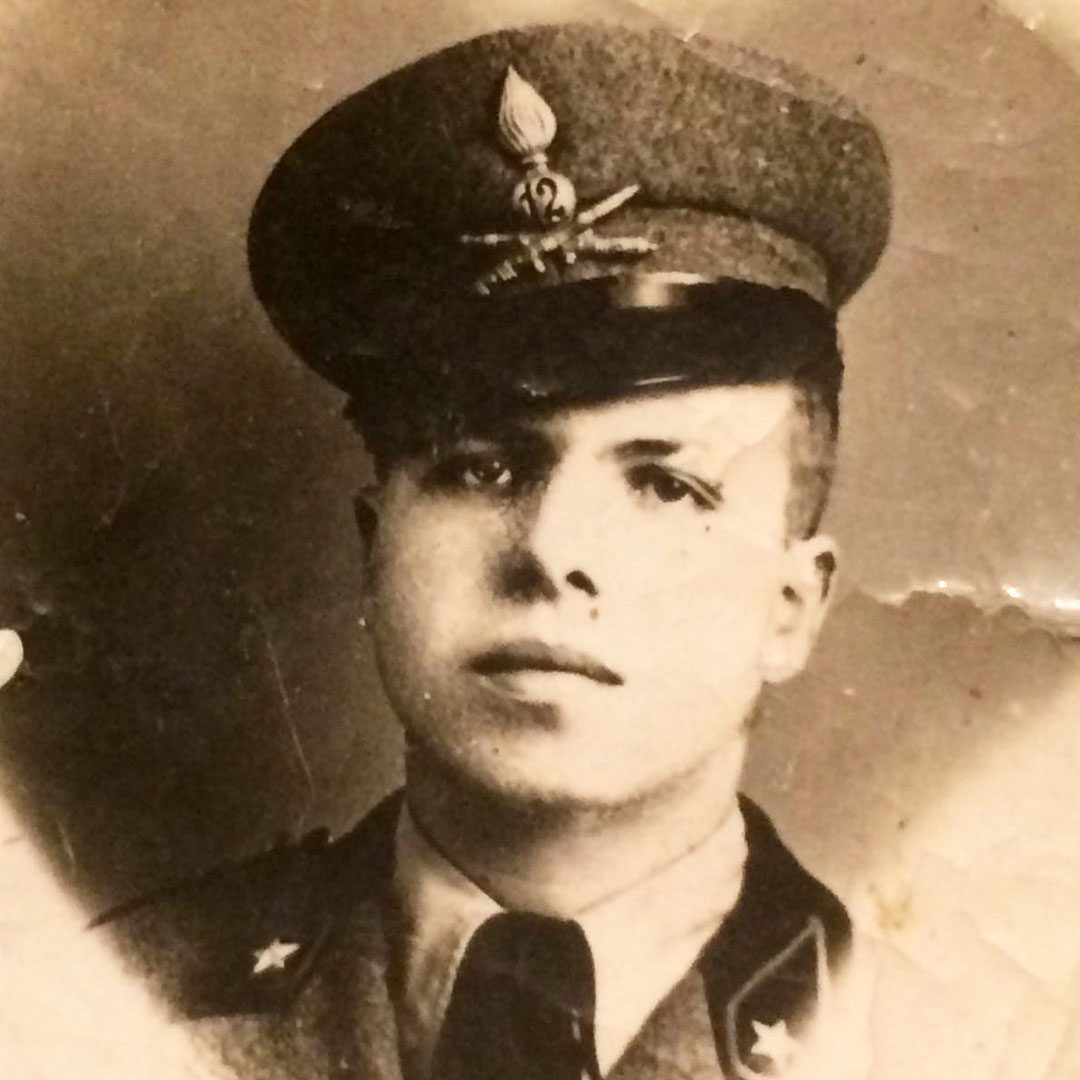
My grandfather Mario as a young man... it's absolutely unbelievable how much I look like him: same cut of the eyes, same full lips, same shape of the face... and I could go on!
Grandpa Mario had an extremely peaceful disposition (although he also had a real temper) and always said that throughout the war he never picked up a weapon of any kind. Grandpa Mario was a soldier in Sicily and cooked for the other soldiers there. He often recounted two episodes, which occurred while he was on his way up Italy to return home after the Italian army was in disarray with the fall of Fascism on 25 July 1943. In the first he was spotted and attacked by a plane in the countryside, with the plane swooping down towards him and machine-gunning him and then turning away and starting again. Grandpa went around a large tree for cover and this was repeated several times until the plane gave up because it could not hit him. In the second episode during a bombing raid everyone went down into a shelter, while he hid behind a tree (mindful of the first tree that brought him luck!). The shelter was bombed and everyone died, while he remained unharmed. From that day on, when the planes came to bomb him, everyone followed him, considering him very lucky.
Grandfather Mario was captured, like many other soldiers of the Italian army, on 8 September 1943 in Bolzano by German troops. After about 10 days of captivity in Bolzano, he was deported to Austria and interned in Lager XVIIA in Kaisersteinbruch. In this lager the Italian prisoners were treated slightly better than in the other Reich lagers. Grandfather always said that the conditions of the prisoners were inhuman and the sanitary conditions hallucinatory... and from that time I remember that he had a habit of always washing his face with ethyl alcohol.
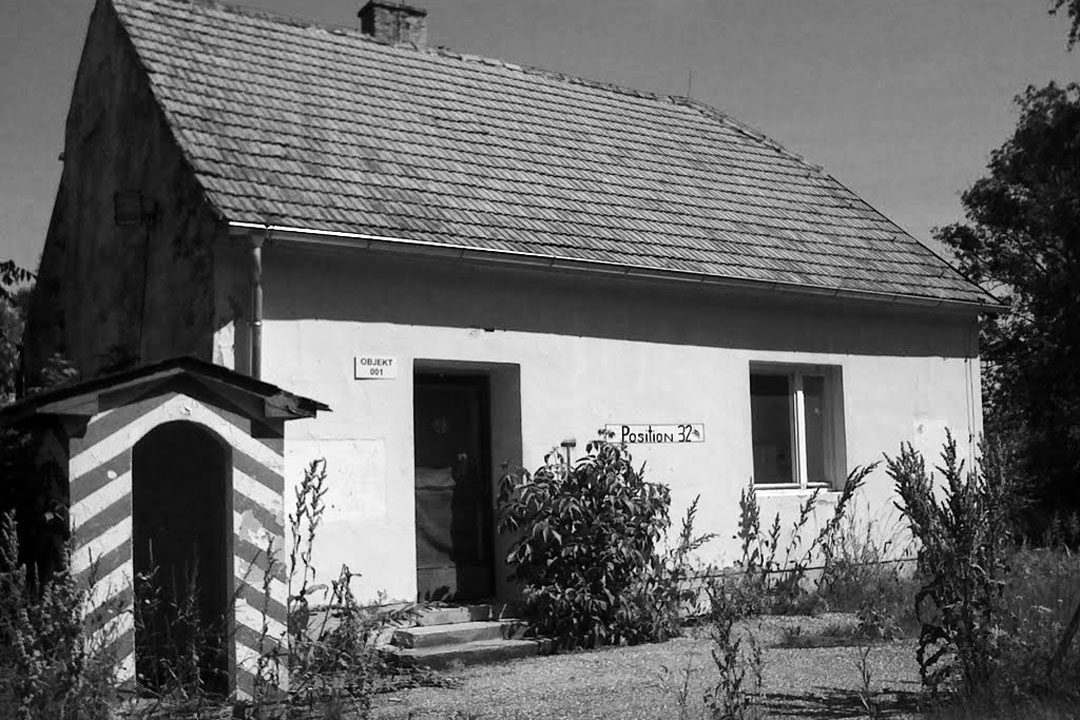
Stalag XVIIA in Kaisersteinbruch
He remained a prisoner in the Stalag XVIIA in Kaisersteinbruch until 10 October 1943, and was then taken to Enns to a sugar factory that served as a transitional camp. On 9 December 1943 he was taken to Vienna to a school used as a Lager. He was taken from the school in the mornings to go to work at companies requiring labour. On 13 March 1944, he was transferred to the Liesing Lager, also a former school used as a Lager, and remained there until the end of the month. When the Allies bombed the Lager he was taken back to Vienna and here he buried the dead in the cemetery. He went out in groups of 10-15 men unaccompanied. Shortly afterwards he was sent to a nearby location to work as a carpenter and repair houses damaged by bombing. Of course Grandpa worked as a prisoner and did not receive any pay. From September he started working outside unaccompanied and, shortly before the bridge over the Danube was blown up by Russian bombing, on 5 April 1945, he managed to escape from Vienna and return to Bozen. Here he was a guest of a family for about a month, from 12 April to 20 May 1945, when he started his journey home. On the return journey he spent the night in Bologna in the truck in which a dozen civilians were travelling in the direction of Forli. On 23 May 1945, the lorry driver unloaded him at home and his old father exclaimed in dialect: 'but have you already come home?' and hugged him tightly.
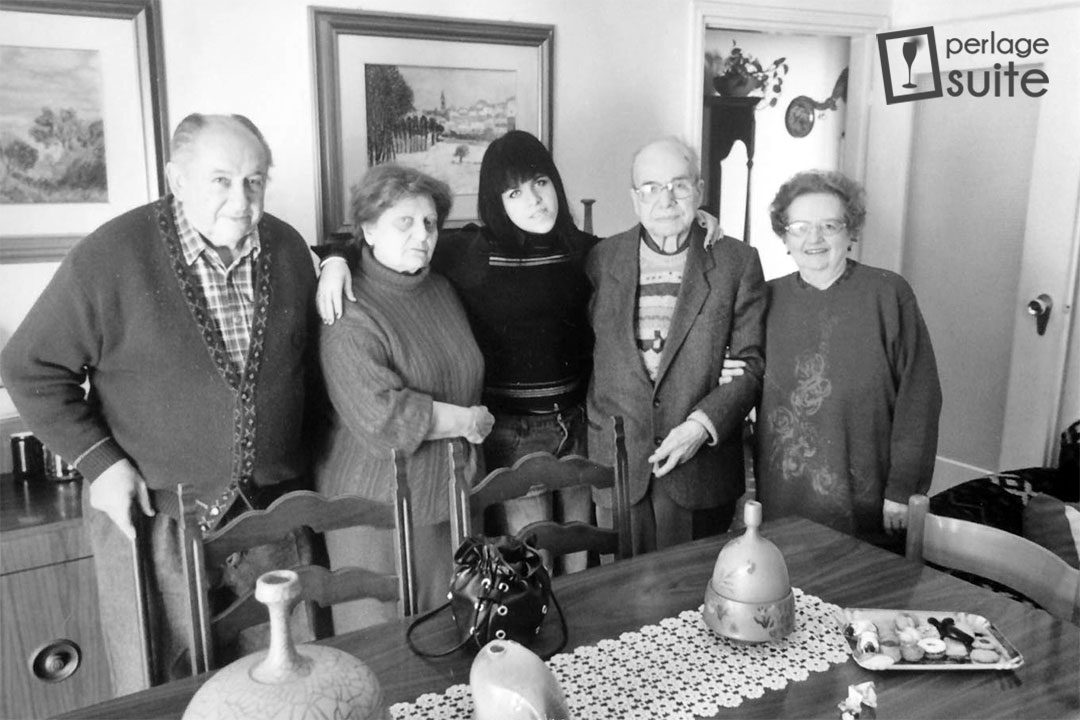
And here I am about ten years ago with all four of my grandparents... at Grandma Lelia's house. Grandpa Wagner painted all the pictures on the walls (did I inherit my drawing skills from him? After all, my dad also draws very well...). I think this is perhaps the last picture all together. From the left Grandpa Wagner, Grandma Lelia, myself, Grandpa Mario and Grandma Diomira.
I am not racist. I respect decent people of all colours and cultures.
I am not religious. I respect decent people who have a faith, whatever it is.
I am not political. I respect decent people left, right, centre, above, below.
But I am very intolerant of those who distort history to legitimise things that should not be legitimised. Every dictatorship must be fought, regardless of whether it is left-wing or right-wing, religious or atheist. Fascism, even the ideal fascism, propagates a supreme leader at the head of a Rome that conquers the world with violence, which the 'subject citizens' must obey and that is all. In Fascism, freedom and democracy do not exist, and for those who do not obey there is the reconstituted death penalty (Fascist Law of 5 November 1926): what individual with a modicum of empathy would really want that?
I want us all to remember the 15 million deaths the Holocaust caused in concentration camps alone... and some historians claim this is a conservative estimate. Then I want us to remember that the 11 September 2001 attacks have caused less than 3,000 victimsjust to give an order of magnitude to things. Yet I have never heard an Italian support the tragic events of 11 September 2001, so I would be happy not to hear support for Fascism and all its related atrocities either.
"One day the fascists found a 15-year-old boy with papers in his pocket 'that he was not supposed to have'. They took him to the front of the house, grabbed his parents and made them sit in front of their son. They held them down and forced them to watch him being tortured. They pulled out all his fingernails, cut off his ears first, then his tongue, then his testicles and finally gouged out his eyes. The parents repeatedly fainted upon seeing the abuse done to their son, and the fascists kept throwing ice water on him to wake them up and force them to watch. Finally, they attached him to the car all bleeding and dragged him away. The trail of blood marked a long way, but the boy was never found again. The mother died the next day of a broken heart while the father lost his mind and died two years later."
From a memory of Grandma Lelia
 A toast then with my grandfather Mario's favourite wine, the sweet albana from Cantina Trerè... which was perhaps the first wine I ever drank in my entire life. For his last birthday, however, I remember giving him a bottle of raisin albana (now renamed with the new labels and called Mrösa) that we all drank together... for the last time. How he loved it! (By the way, you can find it HERE).
A toast then with my grandfather Mario's favourite wine, the sweet albana from Cantina Trerè... which was perhaps the first wine I ever drank in my entire life. For his last birthday, however, I remember giving him a bottle of raisin albana (now renamed with the new labels and called Mrösa) that we all drank together... for the last time. How he loved it! (By the way, you can find it HERE).
Mrösafrom the Romagna dialect lover, amata, amorous, dama... perfect for a wine obtained by drying overripe and partially mouldy grapes in the field. The must obtained is fermented in 250-litre oak barrels in which it remains for 2 years before bottling. On the nose, notes of candied citrus fruit, ripe apricot, vanilla and acacia honey. In the mouth it is pure delight, soft, persistent, with a sweet but not cloying flavour... and for me it is absolutely perfect in combination with blue cheeses, especially with the spoonable gorgonzola which is so special here on Lake Iseo. Try it to believe it! 😉
This toast is for you dear grandparents. This toast is to remind anyone who experiences the comforts of our age as an existential drama of what you have suffered. What the world has paid for the folly of a handful of men, with over 68 million victims, almost 44 million of them civilians alone. Since the day my Aunt Anna remembers that she had found a 5 lire coin in the ditch, with Grandma Bina crying with joy because after so many potatoes she had bought 1 kg of chestnuts to celebrate, barely 80 years have passed.
At your next 'whim' about the more or less useless crap you want to buy, think about it. I will think about it.
Now I can wipe away the last tear, because between the lack I suffer from you and the sadness that assails me to think that you have experienced so much pain, I have been writing weeping practically the whole time.
See you soon,
Chiara
PS if you have memories of your great-grandparents, grandparents or parents that you would like to recount please leave me a comment. Everything is important NOT TO FORGET.
